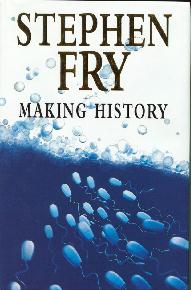

MAKING HISTORYby Stephen FryHutchinson0-09-179141-3389pp/£15.99/1996 |
 |
Reviewed by Steven H Silver
British author Stephen Fry is most well known as actor who has appeared in "Blackadder", "Jeeves & Wooster" and "Peter's Friends." Making History, however, is his third novel, so he can be considered something of a novelist as well. This particular novel is an alternate history, although Fry classifies it as an alternate reality.
Michael D. "Puppy" Young is a graduate student reading history at Cambridge. His recently finished thesis is on the childhood of Adolf Hitler, a person who has always fascinated Young, not because of who he was, but because of the simple coincidence that they were both born on April 20. A chance meeting with Leo Zuckerman, a refugee whose father was at Auschwitz, provides the impetus of the adventure. Zuckerman has a feeling about Young and shows him a device that Zuckerman has invented which can transmit shadowy images from the past. Zuckerman has it tuned to the day his father arrived at Auschwitz. The two men work to build a transmitter so they can send a permanent male contraceptive pill which Young's girlfriend has developed, to poison the water supply in Brunau, in time to stop Adolf Hitler from being born.
The first half of the novel, which sets the scene, varies between being tedious and interesting. Several of the chapters show Hitler's parents or Hitler in World War I and introduce us to a person who will figure prominently in the second part of the novel, Rudolf Gloder. Strangely enough, the interesting parts cannot be said to belong only to the present-day sequences or the historical sequences. They vary without regard to the characters. One of the techniques which Fry uses repeatedly, however, writing three of the chapters as movie scripts, is probably where the novel bogged down the most, especially the final segment where Fry began introducing a lot of background and action which was not germane to the plot, or even a strong sub-plot.
The second half of the novel is when Fry really hits his stride. Apparently successful in ridding the world of Adolf Hitler, Young has found himself as an American student at Princeton. Much of this part of the book is spent with Young trying to figure out who he is and later, what the history of this new twentieth century is. As with the first section of the book, Fry returns to World War I and we get to witness Rudi Gloder's rise in the absence of Adolf Hitler.
Very little that Fry does is unique or surprising to anyone who has read a fair amount of alternate history. This novel, however, is being marketed in the mainstream, however, and will hold a certain amount of appeal to the readership which found Harris's Fatherland an intriguing read. Fry does handle his material well, and even if he doesn't deliver many full-fledged surprised, the moment when the reader realizes where Fry is going with the pieces of the novel is worth the price of admission.
